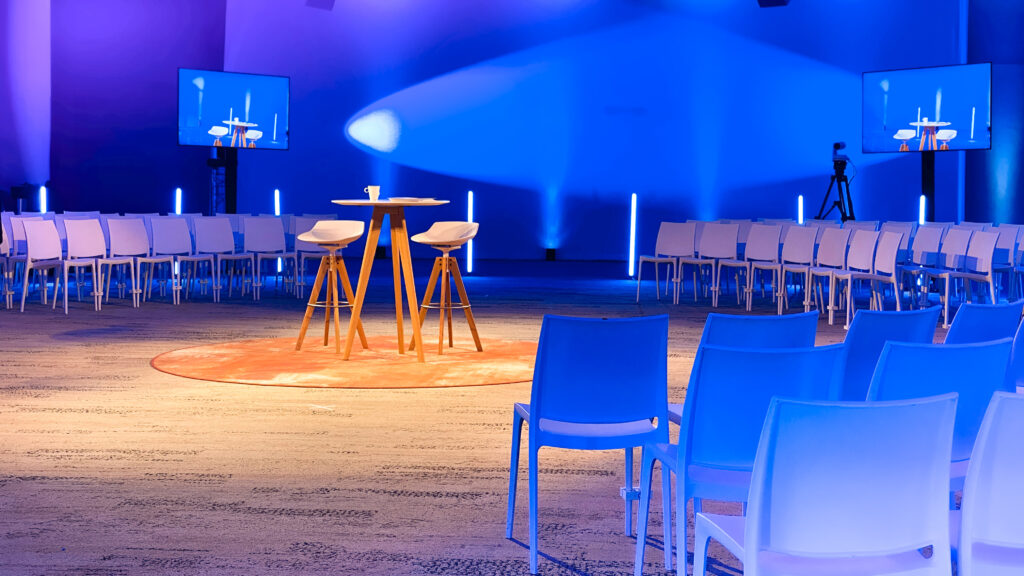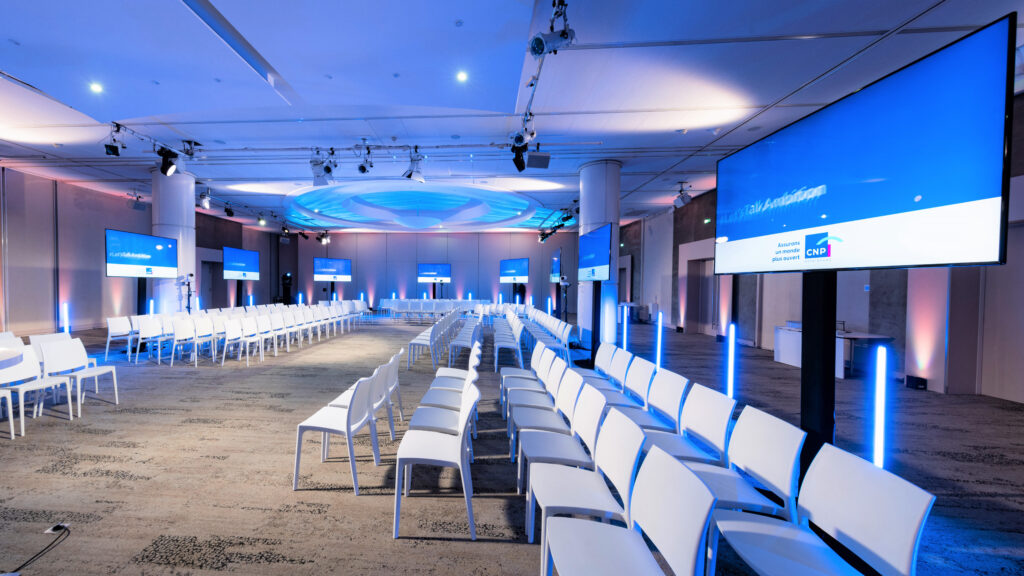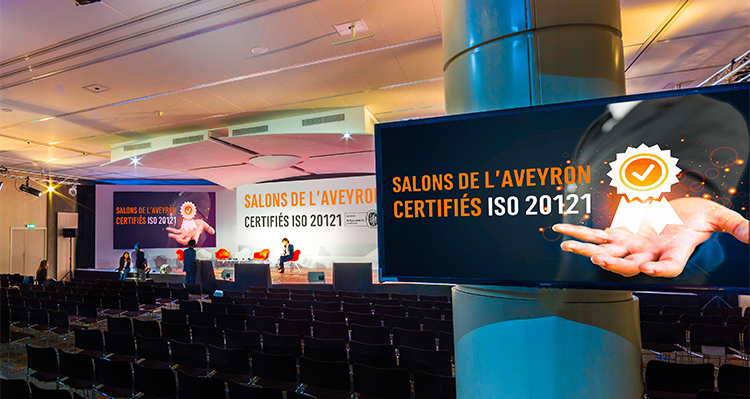Trends in Professional Seminar in Paris
Faced with the multitude of options for organizing a professional seminar in Paris, the choice can be complex. Whether you’re a manager seeking innovation, an event coordinator, or simply a company looking to optimize its meetings, this article offers valuable insights. From selecting the venue to post-event analysis, including technological and environmental aspects, all these pieces of information help stakeholders design effective and memorable seminars.
Choosing the Venue for a Seminar in Paris
When renting a seminar room in Paris, the selected location is of paramount importance. The venue should promote concentration and work while providing a pleasant environment for breaks. Iconic venues such as private mansions or historic halls are favored for their uniqueness and ability to impress. Flexible and modern spaces are also gaining ground.
Accessibility remains a fundamental element when selecting a seminar venue in Paris. It is essential that all participants can easily access the site, whether they are locals or coming from other regions. Therefore, a central location near major transport links is often chosen.
Given the evolving needs of companies and new market trends (remote work, digitalization), some opt for more avant-garde solutions like collaborative or virtual spaces. Each company must adjust its criteria according to its specific objectives and the particular expectations of its target audience to choose the right seminar room in Paris.
Defining the Objective
Defining the objective of renting a room in Paris for a professional seminar is a crucial step that conditions the success of the event. Paris, with its multitude of opportunities, encourages organizers to refine their expectations.
Each seminar has its own purpose, whether it’s to strengthen team cohesion, educate employees on a new product, or discuss the company’s strategic directions. Setting this objective in advance helps to precisely identify the target audience and allows for an effective structuring of the program.
Moreover, this preliminary approach fosters better engagement among all participants. When they understand why they are gathered and anticipate the potential benefits for themselves and their organization, their involvement in the process is heightened.
Additionally, this well-defined objective must be communicated internally to be shared by everyone. It acts as a guide during the various phases of the project: venue selection—as mentioned earlier—speaker selection, or the creation of educational materials.
To conclude on this vital point of defining the objective of a professional seminar in Paris—where all sorts of options are possible—it is crucial that the objective is realistic and achievable to ensure a successful and beneficial event for all participants.
Seminar Participants: An Essential Ecosystem for Success

Seminars, whether academic, professional, or thematic, are dynamic platforms where various actors meet and interact. The diversity of participants in a seminar is crucial for creating a rich and interactive learning environment. This overview highlights the key participants who contribute to the success of a seminar.
The Organizer: The Conductor
The organizer plays a central role in setting up the seminar. It is often a person or team that designs, plans, and executes all the necessary steps to bring the event to fruition. Their task begins with defining the seminar’s objectives, choosing the theme, selecting speakers, and continues through to managing logistics on the day of the event. Their goal is to create a smooth and enriching experience for all participants.
Speakers and Presenters: The Experts at the Center of Attention
Speakers or presenters are experts in the field covered by the seminar. They bring their expertise, share in-depth knowledge, and present relevant case studies. Their role is decisive, as they provide the main content of the seminar and stimulate discussions. A good speaker knows how to captivate their audience, answer questions precisely, and inspire new ideas.
Moderators: The Facilitators of Exchange
Moderators ensure the smooth running of sessions. They introduce the speakers, manage speaking times, and orchestrate question-and-answer sessions. Their role is to facilitate exchanges and ensure that discussions remain relevant and productive. They must be well-informed on the seminar topic to intervene constructively and guide debates.
Participants or Audience: The Active Audience
Participants, also known as the audience, attend the seminar to gain new knowledge, expand their network, and interact with experts and peers. They can be students, professionals, researchers, or anyone interested in the seminar’s theme. Their active participation, through questions, comments, and discussions, enriches the seminar and can often lead to future collaborations.
Sponsors: The Financial Supporters
Sponsors are companies or organizations that finance the seminar in exchange for visibility and recognition. They play an important role in providing the resources needed to organize the event. Their contribution can range from funding logistical costs to providing promotional materials.
Facilitators: The Logistical Pillars
Facilitators are usually members of the organizing team who handle the technical and logistical aspects of the seminar. They manage participant registration, take care of audiovisual equipment setup, and ensure everything runs smoothly. Their role is essential in ensuring the event is conducted professionally and seamlessly.
Organizing Sessions
Relaxation to Consider
For effective seminar organization, it is recommended to place significant importance on participants’ well-being. In Paris, the current trend is towards a relaxed professional environment that prioritizes relaxation and comfort. This includes peaceful spaces for meditation and may extend to offering activities like yoga or massages as a complement to the main program:
- Peaceful spaces promoting focus.
- Yoga sessions for stress management.
- Chair massages during restorative breaks.
- Comfortable settings facilitating relaxation.
Networking to Promote
When organizing a professional seminar in Paris, networking plays a crucial role. It’s not just about learning, but also about sharing experiences and knowledge with peers. Organizers ensure the creation of various informal opportunities (networking coffee, cocktail dinners) where participants can exchange freely in a less formal environment.
Creativity to Stimulate
Finally, another major trend in Parisian professional seminars is to stimulate creativity among participants. Interactive sessions are set up around specific issues where each individual is encouraged to contribute their unique ideas and solutions. The use of new technologies, such as virtual reality or interactive whiteboards, is also a key element in these seminars to foster innovation.
Seminar in Paris: What Theme?

Choosing a theme for a seminar room in Paris should not be taken lightly. It is a determining factor that will influence the interest and success of the event. The actors in the Parisian professional world are eager to train, seeking relevant, contemporary topics related to their field of activity.
Trend analysis reveals that themes related to technological innovation, digital transformation, or sustainable development resonate particularly well with participants. These modern topics address current business challenges and foster collective mobilization around shared issues.
It is imperative to emphasize that these topics must be addressed with a practical and operational approach to provide participants with applicable tools in their professional daily lives. The participation of recognized experts in these fields is a key element to ensure the seminar’s seriousness.
In addition to selecting the theme itself, its formulation plays a decisive role. It is therefore necessary to carefully craft its wording so that it is attractive while being sufficiently explicit about what will be offered during the Paris seminar.
Opting for a relevant topic, aligned with the precise expectations of Parisian professionals, along with careful emphasis, are all criteria that will contribute to the success of your seminar in Paris.
Seminar in Paris: What Technology to Use?
Virtual Immersion
Virtual reality is a technology that is gaining increasing importance in professional seminars in Paris. It allows participants to immerse themselves in simulated environments and offers a new dimension to learning and knowledge sharing. For example, speakers can use this technology to present complex or abstract concepts in a visually captivating and interactive way. This approach not only stimulates a sense of wonder, but also facilitates understanding.
Interactive Participation
Beyond simply listening to a speaker, seminars are now leaning towards active participant involvement. The use of systems that allow real-time voting represents a significant advancement in this area. These interactive tools encourage the audience to share their views or ideas, creating an environment conducive to enriching and constructive debates. By involving each individual actively in the seminar rather than as a passive spectator, the exchange of ideas and collective decision-making is promoted.
The Valuable Help of AI
It would be impossible to discuss technological trends without mentioning the growing role that artificial intelligence (AI) plays in these professional events in Paris. Whether to automate certain arduous logistical tasks or to analyze in-depth the data collected during the seminars, AI offers a plethora of possibilities. For example, it can help determine the topics that generate the most interest or personalize seminar content for each participant. AI contributes to making professional seminars more efficient and personalized.
Creating an Atmosphere
Scenography: The Foundations of Atmosphere
Creating an atmosphere for a professional seminar requires particular focus on scenography. This generates, first and foremost, a powerful visual impact and sets the tone for the event. A well-designed decor is essential; it stimulates participants’ senses, encourages their involvement, and reinforces the seminar’s message. The arrangement of furniture, the colors used, or the artworks displayed are elements that effectively serve this objective.
Musical Ambiance: The Rhythm of the Seminar
The choice of music plays a decisive role in creating an appropriate atmosphere during professional meetings. Music acts as a powerful emotional tool capable of evoking various moods and attitudes among participants. A carefully selected playlist can help maintain energy throughout the event and intensify the overall experience for each participant.
Specific Lighting: Playing with Shadows and Light
Finally, to complete this sensory triptych dedicated to contemporary professional meetings, we have the crucial role played by specific lighting in creating a unique atmosphere. The subtleties between shadow and light can add an extra dimension to the scenography, highlighting certain crucial points or creating striking contrasts. This is particularly the case during conferences or interactive workshops where lighting is adjusted to spotlight the presenter and focus participants’ attention.
Original Meal Services
How would you react to an original meal service during a professional seminar? It is undeniable that an innovative and surprising gastronomic experience can contribute to the appeal of professional gatherings.
In the French capital, a trend has emerged in the seminar world with a diverse and bold culinary offering that transcends the simple coffee break or traditional buffet. Organizers show great creativity in offering participants exceptional gastronomic experiences, ranging from blind tastings to cooking workshops, and even themed meals inspired by different cultures.
The astute selection of a caterer specializing in this type of service can be decisive. They not only offer an impressive variety of food alternatives but also a refined presentation that stimulates the senses and encourages conversation between colleagues or business partners.
One should not overlook the impact these innovative services can have on the dynamism and success of a seminar. They are an excellent way to encourage social interactions, strengthen team spirit, and keep participants engaged throughout the gathering.
However, it is essential to always offer a balanced menu that respects all types of dietary restrictions so that each participant can fully enjoy the moment without feeling isolated or hindered by their dietary constraints.
CSR

Adherence to ISO 20121
Aligning with the ISO 20121 standard has become an essential trend for meeting rooms in Paris and professional seminars. This international regulation, dedicated to sustainable events, ensures eco-responsible and socially acceptable management. It offers several benefits:
- It reduces the negative impact on the environment.
- It encourages local economic progress.
- It promotes better resource management.
- And it supports social and cultural inclusivity.
The commitment of Parisian seminar planners to this regulation demonstrates their dedication to a sustainable event sector.
Responsible Waste Management
Another emerging trend in professional seminars is more judicious waste management. Planners are now aware of the significant volume of waste generated during such gatherings, from food packaging to promotional materials to obsolete technical equipment. Increased attention is given to recycling and composting whenever possible, as well as the use of reusable or biodegradable materials to minimize environmental impact.
Local Promotion: A Strategic Choice
Supporting local producers is gaining popularity in the context of Parisian professional seminars. Planners are increasingly turning to local suppliers for catering, entertainment, and even venue selection. By doing so, they help stimulate the local economy while reducing their carbon footprint associated with the transport of products and services. This also allows participants to discover regional specialties and experience an authentic experience during their stay.
Event Analysis
Feedback Collection: A Key Step
A notable trend in professional seminars in Paris is the emphasis on feedback collection. Event planners now recognize the essential role of feedback in evaluating their performance and optimizing participants’ experiences. The systematic collection of opinions, whether through digital questionnaires or in-person interviews, provides direct and immediate insight into the strengths and weaknesses of the professional gathering.
Quantifiable Evaluation: A Precise Tool
In addition to qualitative feedback collection, planners rely on quantitative measures to assess their events. The increasing use of technologies like mobile apps or digital platforms allows for real-time tracking of participant numbers, their engagement levels during workshops or conferences, or even their overall satisfaction. These digital insights provide an objective means to evaluate the seminar’s success.
Learning to Prepare for the Future
This analytical approach is not solely aimed at post-event review; it greatly contributes to shaping future actions. Thanks to the feedback obtained and the quantified results mentioned earlier, it becomes possible to identify which themes were well-received by participants—thus maintaining them for future seminars—or to pinpoint aspects that need improvement. This strategy allows planners to look to the future with a clear vision, based on concrete elements rather than assumptions. It is a true culture of continuous improvement that is established, offering participants a higher quality event perfectly tailored to their professional expectations.
